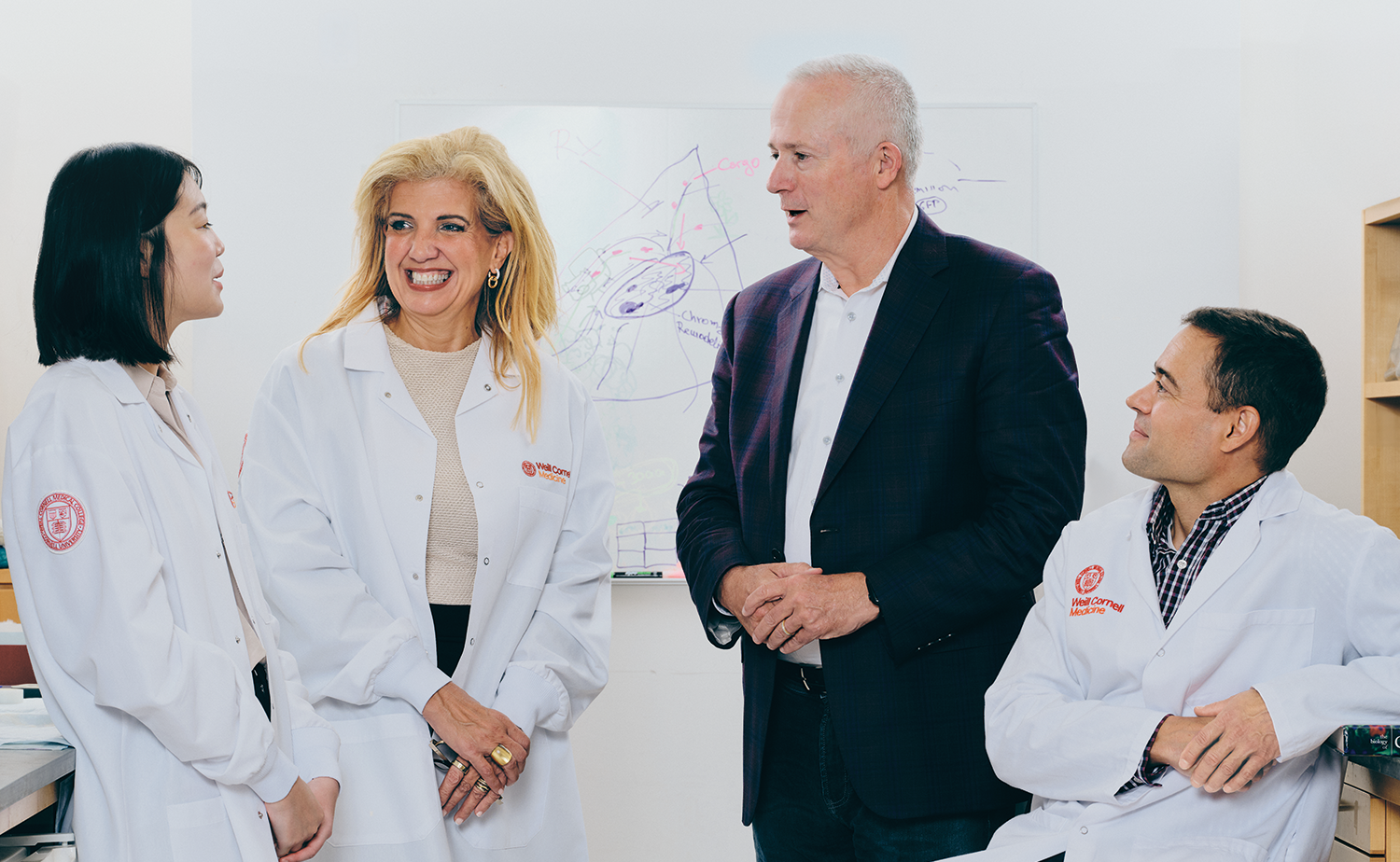
Dr. Cheuk Man Cherie Au, Dr. Paraskevi Giannakakou, Dean Robert Harrington, M.D. and Dr. Steven Josefowicz
Fueled by strategic philanthropic support, Weill Cornell Medicine is fostering a thriving culture of entrepreneurship and accelerating the translation of groundbreaking research into new life science technologies to improve patient health.
Through the structure of Enterprise Innovation, Weill Cornell Medicine provides the necessary support for faculty and trainees to advance their work along the path to the marketplace, from inception to commercialization. The innovation ecosystem includes the BioVenture eLab, which is dedicated to biomedical entrepreneurship, and the Center for Technology Licensing at Weill Cornell Medicine, which facilitates the commercialization of inventions. It also includes the Catalyst Fund, launched this spring as a reimagining of the Daedalus Fund for Innovation, which provides funds to bridge critical gaps and accelerate the path to commercialization.
“We serve as the shepherd between academic research and the commercial translation of that research into tangible products,” says Dr. Lisa Placanica (Ph.D. ’09), who leads Enterprise Innovation and is the senior managing director of the Center for Technology Licensing at Weill Cornell Medicine. “Our generous donors play a key role in supporting the entrepreneurial ecosystem and expanding the research pipeline.”
“Everything we do at Weill Cornell Medicine is aimed at improving human health, and with the essential support of donors who share our mission, Enterprise Innovation is poised to make a strong translational impact on patients’ lives in the years ahead,’’ says Robert A. Harrington, M.D., the Stephen and Suzanne Weiss Dean. “In this changing landscape of research funding, commercialization has the power to generate revenue that can help sustain our research enterprise.”
Through a growing network of collaborators across academia, industry and investment, New York City is establishing itself as a formidable center for biotechnology and life sciences, with Weill Cornell Medicine at the heart of an Upper East Side corridor of world-class science and medicine, he says.
“We’re empowering our scientists to build the partnerships and entrepreneurial mindset needed to engage the biotech sector,” says Dr. Placanica. “Donor-funded programs encourage the commercial translation of their discoveries, creating new opportunities for continued investment and innovation.”
With numerous programs that nurture junior and senior scientists – and a new funding infrastructure that provides financial resources for promising research programs with commercial potential – Enterprise Innovation is well structured to maximize the impact of philanthropic support, she adds.

Richard and Amy Ruben
Donors who have supported Enterprise Innovation include Board of Fellows Vice Chair Richard Ruben and his wife, Amy Ruben, whose recent $2 million gift established the Enterprise Innovation Catalyst Fund, which supports promising early-stage research with commercial potential.
The Ruben family’s legacy of support also includes the Selma and Lawrence Ruben Validation Stage Awards, established in 2017 by Richard Ruben and his sisters, Lenore Ruben and Shelly Kivell, as part of Weill Cornell Medicine’s inaugural donor-supported commercialization fund designed to fill the critical gap in research funding.
“As longtime supporters of innovation and discovery commercialization at Weill Cornell Medicine, we remain committed to filling that gap in research funding,’’ says Mr. Ruben. “We want to help move promising discoveries out of the lab and into the marketplace, where they can ultimately improve patient care.”
“We are grateful to Amy and Richard Ruben, not only for their generous support of Enterprise Innovation, but for guiding its future at Weill Cornell Medicine,’’ says Dean Harrington. “Their leadership is empowering our researchers to advance their discoveries and bring them closer to real-world application.”
The Catalyst Fund bridges funding gaps in research and commercialization efforts at various stages of development. It includes the Proto Stage Award, which funds digital health projects to validate preliminary proof-of-concept ideas and expedite the development of prototypes; the Breakout Stage Award, which awards larger funding to projects that need commercial de-risking in order to advance; and the Validation Stage Award, which incorporates the Selma and Lawrence Ruben Validation Stage Awards.
A wide range of Weill Cornell Medicine scientists and researchers have benefited from Enterprise Innovation and Catalyst Fund support in their commercialization and entrepreneurial journeys, including Dr. Paraskevi Giannakakou, professor of pharmacology in medicine. Dr. Giannakakou is an awardee of the Catalyst Fund and a past winner of the Biomedical Innovation Challenge, an annual Weill Cornell Medicine competition that is a cornerstone of the BioVenture eLab’s programming. She and Dr. Cheuk Man Cherie Au, an assistant professor of pharmacology research in medicine, co-founded Arma Bio, which is working on first-in-class treatments for prostate cancer.
Recent winners of the Biomedical Innovation Challenge also include Dr. Steven Josefowicz, associate professor of pathology and laboratory medicine and a co-founder of EpiStemyx, which uses blood stem cells to treat and diagnose various diseases.
Graduate students, post-doctoral researchers and other early-career scientists can take part in Accelerating BioVenture Innovation, another BioVenture eLab program, which covers the fundamentals of launching a company and culminates in a biomedical business plan pitch competition.
Donors who are interested in supporting any aspect of the innovation and commercialization ecosystem can pair their interests with a variety of funding opportunities, says Dr. Placanica.
“Philanthropy is already making a vital difference in the future of academic medicine,” says Dean Harrington. “Now, more than ever, it is essential that we bring our world-class science to the marketplace, where it can have a lasting impact on human health.”
